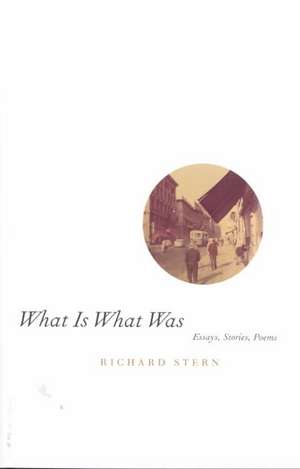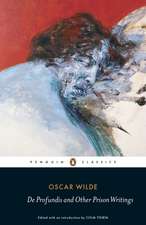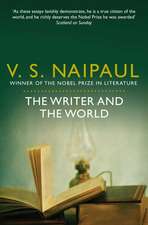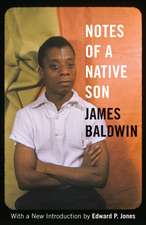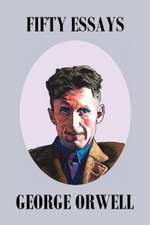What Is What Was
Autor Richard Sternen Limba Engleză Paperback – 8 sep 2002
What Is What Was, Richard Stern's fifth "orderly miscellany," is the first to meaningfully combine his fiction and nonfiction. Stories, such as the already well-known "My Ex, the Moral Philosopher," appear among portraits (of the sort Hugh Kenner praised as "almost the invention of a new genre"): Auden, Pound, Ellison, Terkel, W. C. Fields, Bertrand Russell, Walter Benjamin (in both essay and story), Jung and Freud, Hannah Arendt and Martin Heidegger.
In the book's seven sections are analyses of the Wimbledon tennis tournament as an Anglification machine, of Silicon Valley at its shaky peak, of James and Dante as travel writers, a Lucretian look at today's cosmology, American fiction in detail and depth, a "thought experiment" for Clarence Thomas, a salvation scheme for Ross Perot, a semi-confession of the writer.
The book contains but isn't philosophy, criticism, opinion, reportage, or autobiography (although the author says it is as much of this as he plans to write). There is a recurrent theme, the ways in which actuality is made and remade in description, argument and narration, fictional and nonfictional, but above all, What Is What Was is a provocative entertainment by a writer who, as Philip Roth once said, "knows as much as anyone writing American prose about family mischief, intellectual shenanigans, love blunders—and about writing American prose."
In the book's seven sections are analyses of the Wimbledon tennis tournament as an Anglification machine, of Silicon Valley at its shaky peak, of James and Dante as travel writers, a Lucretian look at today's cosmology, American fiction in detail and depth, a "thought experiment" for Clarence Thomas, a salvation scheme for Ross Perot, a semi-confession of the writer.
The book contains but isn't philosophy, criticism, opinion, reportage, or autobiography (although the author says it is as much of this as he plans to write). There is a recurrent theme, the ways in which actuality is made and remade in description, argument and narration, fictional and nonfictional, but above all, What Is What Was is a provocative entertainment by a writer who, as Philip Roth once said, "knows as much as anyone writing American prose about family mischief, intellectual shenanigans, love blunders—and about writing American prose."
Preț: 237.92 lei
Nou
Puncte Express: 357
Preț estimativ în valută:
45.53€ • 47.36$ • 37.59£
45.53€ • 47.36$ • 37.59£
Carte tipărită la comandă
Livrare economică 15-29 aprilie
Preluare comenzi: 021 569.72.76
Specificații
ISBN-13: 9780226773261
ISBN-10: 0226773264
Pagini: 328
Dimensiuni: 140 x 216 x 23 mm
Greutate: 0.39 kg
Ediția:1
Editura: University of Chicago Press
Colecția University of Chicago Press
ISBN-10: 0226773264
Pagini: 328
Dimensiuni: 140 x 216 x 23 mm
Greutate: 0.39 kg
Ediția:1
Editura: University of Chicago Press
Colecția University of Chicago Press
Notă biografică
Richard Stern is the Helen Regenstein Emeritus Professor of English and of the Humanities at the University of Chicago and the author of nineteen words of fiction and nonfiction. His novels include A Father's Words and Golk, both published by the University of Chicago Press, and, most recently, Pacific Tremors.
Cuprins
Preface
I.
Others Seen through Me
With Auden
Remembering Pound
Ralph Ellison
Studs: WFMT, April 7, 1995
A Very Few Memories of Don Justice
The Venetian Sculptress
Ray West and the Iowa Writers' Workshop
My Ex, the Moral Philosopher
II.
Places
Where the Chips Fall
Wimbledon, 1992
James, the Traveler
Going and Coming: On Celati's Adventures in Africa
An Indiana Library
My Chicago
The Chicago Writer's City
Books and Chicago, Chicago and Books
A Glance at Bellow in Chicago, 1993
Chicago, in the Depths of Feeling
III.
The Is of Was
Over the Hill
On Atlas on Bellow
Bertrand Russell
Misunderstanding Carnap
W. C. Fields
Hannah Arendt and Martin Heidegger
Jung
The Outsider Inside
Benjamin's Way
Almonds
IV.
Miscellaneous Commentaries and Opinions
Warriors of the Open, 1996
Tears, Idle Tears, I Now Know What They Mean
King of a Rainy Country
Logging Expiation
Montaigne in Illinois
Ozick on Kafka, Frank, and Ozick
Jane Jacobs's Ideas
Our Regenstein
Chipping at the Schools
From Van Meegeren to Van Blederen
Dark Energy, Dark Matter, and the Waves of Genesis
Eliminating the National Debt
His Good Name
Letter to the Editor, New York Times
To Go with an Old Necklace...
Statement for the Meeting of the University of Chicago Senate on April 29, 1986
A Few Words from Someone Who's Written a Few Too Many
V.
On Fiction
A Few Things American Fiction Says
Malamud's Stories
His Other Life
Austin Wright
Vidal in Conclusion
Updike's Brushstroke
Fictionally De-Cubaed
Rupert Thompson
Call It Recall
Killing Chic
VI.
On Friends, Here and Gone
For John Wallace
The Ones Who Do Things for Us (Alane Rollings)
Edward Levi
Arthur Heiserman
Imre Horner
Misremembering Montale
Words about Hugh
For Ernest Sirluck
For Leon Forrest
VII.
On Myself
An Old Writer Looks at Himself
Monologue
Acknowledgments
I.
Others Seen through Me
With Auden
Remembering Pound
Ralph Ellison
Studs: WFMT, April 7, 1995
A Very Few Memories of Don Justice
The Venetian Sculptress
Ray West and the Iowa Writers' Workshop
My Ex, the Moral Philosopher
II.
Places
Where the Chips Fall
Wimbledon, 1992
James, the Traveler
Going and Coming: On Celati's Adventures in Africa
An Indiana Library
My Chicago
The Chicago Writer's City
Books and Chicago, Chicago and Books
A Glance at Bellow in Chicago, 1993
Chicago, in the Depths of Feeling
III.
The Is of Was
Over the Hill
On Atlas on Bellow
Bertrand Russell
Misunderstanding Carnap
W. C. Fields
Hannah Arendt and Martin Heidegger
Jung
The Outsider Inside
Benjamin's Way
Almonds
IV.
Miscellaneous Commentaries and Opinions
Warriors of the Open, 1996
Tears, Idle Tears, I Now Know What They Mean
King of a Rainy Country
Logging Expiation
Montaigne in Illinois
Ozick on Kafka, Frank, and Ozick
Jane Jacobs's Ideas
Our Regenstein
Chipping at the Schools
From Van Meegeren to Van Blederen
Dark Energy, Dark Matter, and the Waves of Genesis
Eliminating the National Debt
His Good Name
Letter to the Editor, New York Times
To Go with an Old Necklace...
Statement for the Meeting of the University of Chicago Senate on April 29, 1986
A Few Words from Someone Who's Written a Few Too Many
V.
On Fiction
A Few Things American Fiction Says
Malamud's Stories
His Other Life
Austin Wright
Vidal in Conclusion
Updike's Brushstroke
Fictionally De-Cubaed
Rupert Thompson
Call It Recall
Killing Chic
VI.
On Friends, Here and Gone
For John Wallace
The Ones Who Do Things for Us (Alane Rollings)
Edward Levi
Arthur Heiserman
Imre Horner
Misremembering Montale
Words about Hugh
For Ernest Sirluck
For Leon Forrest
VII.
On Myself
An Old Writer Looks at Himself
Monologue
Acknowledgments
